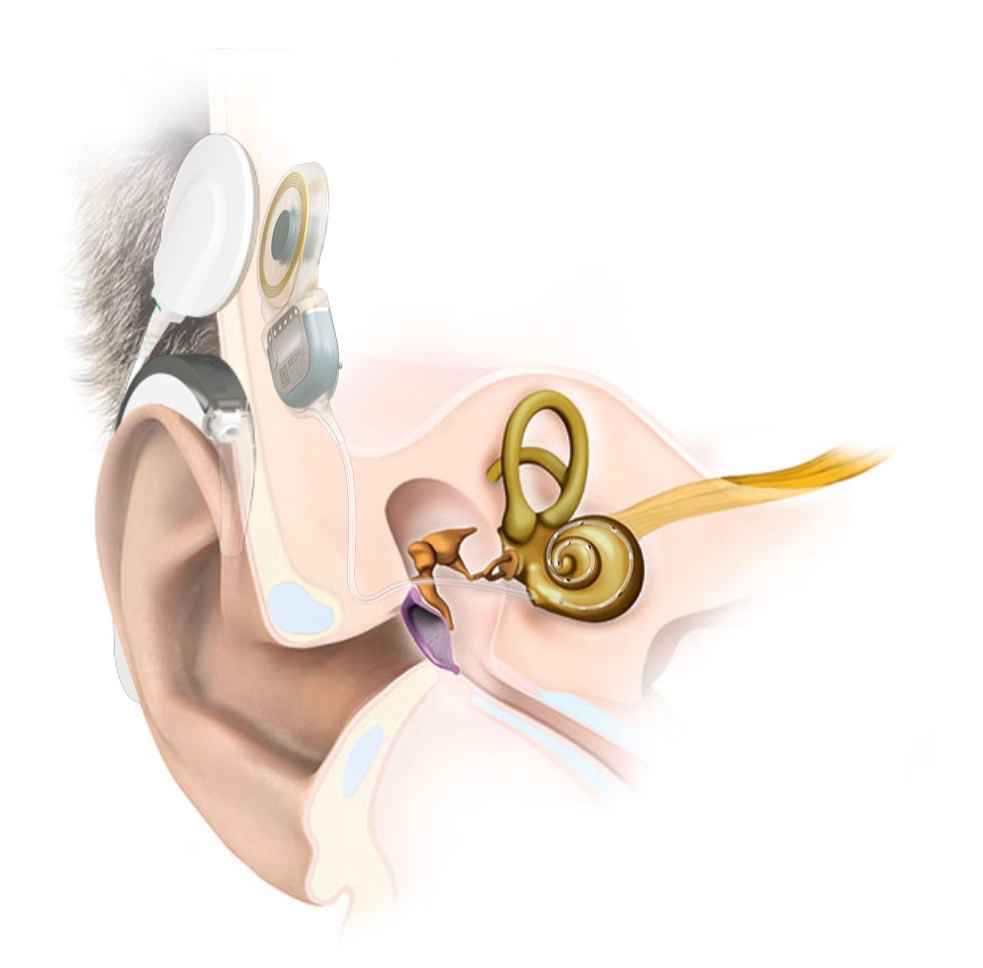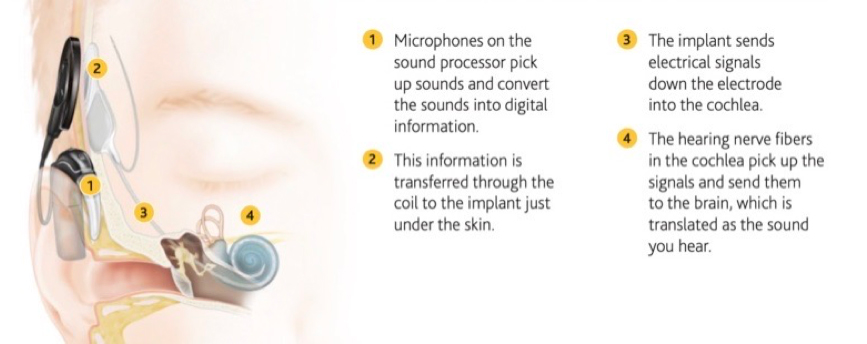
What is a cochlear implant?
A cochlear implant is a surgically implanted device that can restore hearing to an ear with severe to profound hearing loss.
How is a cochlear implant different from a hearing aid?
A hearing aid is a device worn in or on the ear that amplifies sounds to make them easier for someone to hear, but you must have at least some hearing in order for a hearing aid to work. Hearing aids are appropriate for patients with mild to moderately severe hearing loss, including both conductive (mechanical) and sensorineural (nerve-damage) types of hearing loss.
When a patient has hearing loss of the nerve-damage type that is severe-to-profound, a hearing aid may no longer be able to help them. At this point, they may be a candidate for a cochlear implant. This happens because the patient has lost the majority of the tiny sensory nerve endings in their cochlea (the hearing part of the inner ear), which are called hair cells, usually from the ageing process, noise damage, genetic factors, Meniere’s disease, congenital causes, or for reasons that are unknown.
A cochlear implant converts sounds into electrical signals which are then sent into the cochlea (inner ear) and picked up by the nerves of hearing. From there, these signals travel to the brain where they are interpreted as sound. As such, a cochlear implant can restore hearing to an ear that is completely deaf.
This is nothing short of a medical miracle! Hearing is the only one of our five senses that has been replicated by technology and medicine so far.

Cochlear implants are used in patients ranging from infants to the very old so there are no age restrictions. Children who are born completely deaf can receive a cochlear implant(s) as young as nine months of age, allowing them to develop completely normal speech and language and be educated in a mainstream school environment.
Most patients receive only one cochlear implant, and it is usually implanted into their poorer-hearing ear if there is one. They may then continue to wear their hearing aid in their other (better-hearing) ear. This often provides “the best of both worlds”, as the patient then has one of each type of device, and the brain is able to integrate the two types of signals coming from the two sides.
A cochlear implant consists of two parts: (1) a processor, which is worn on the outside of the head, and (2) a surgically implanted receiver/stimulator (implanted once and stays in permanently). The processor contains the batteries and is taken on and off like a hearing aid, although the device only functions when the processor is in place. The processor and receiver/stimulator communicate with each other through the skin via a telecoil held in place by a magnet.
Do cochlear implants work?
For the majority of patients, yes! Some patients receive more benefit than others, but most patients find that their implant significantly improves their ability to hear, understand, and communicate. Most adult cochlear implant patients were hearing aid wearers prior to getting their implant and find that their cochlear implant provides significant improvement in word understanding over their hearing aid.
Am I or is my loved one a candidate for a cochlear implant?
Additional tests of hearing (with the patient wearing their hearing aids) beyond the standard audiogram are required to determine whether a patient is a candidate for a cochlear implant. This will be performed during your visit to the Shea Clinic. Please bring your hearing aids with you and make sure they are in working order.
What is it like to have a cochlear implant?
The sound quality with a cochlear implant is different from that with a hearing aid. Some users report that it sounds like a robot or “electronic” at first. Cochlear implants are designed to improve speech recognition, however, and most users find that they are vastly superior to their hearing aids in this regard. There is usually an adjustment period of a few months while a patient is getting used to the new sound from their cochlear implant but eventually most patients get accustomed to it and adjust to it quite well.
What is involved/required in getting a cochlear implant at the Shea Clinic?
You will need a consultation with Dr. Paul Shea at the Shea Clinic, where you will undergo tests to assess whether you are a candidate for cochlear implantation. Please bring any old hearing tests and other pertinent records and information with you to this visit. If it is determined that you are a candidate for a cochlear implant, then you will be referred to one of the programming audiologists we work with for a pre-implant consultation. This will most likely not be on the same day as your visit to the Shea Clinic. At this consultation, you will meet with the programming audiologist, who will discuss the programming process with you in more detail. In some cases, she may also help you make the decision about which ear would be the best to implant and which device you want. She will discuss the options with you and let you and your family make the final decision. After the consultation, the programming audiologist will send us a report. If she agrees that you are a good candidate for a cochlear implant, then at that point the surgical procedure at the Shea Clinic can usually be scheduled.
What is the recovery like for cochlear implant surgery?
The operation to place the cochlear implant in your ear is an outpatient procedure performed by Dr. Paul Shea at the Shea Clinic Ambulatory Surgery Center. The procedure takes about two hours under general anesthesia. Recovery is fairly easy and there is little pain or discomfort afterwards. You will go home the same day. Your next visit to the Shea Clinic will be approximately one month after your operation, to make sure everything is healing well. At that point, you will also be ready to meet with the programming audiologist to have your device programmed for the first time. This is called the initial stimulation. After this, you will be able to start hearing with your cochlear implant, but you will still need additional programming sessions with her over the next few months to fine-tune the device. You will also be getting used to the new sounds you are hearing with your implant.
How is the programming performed and by whom?
While cochlear implants can indeed provide a significant improvement in hearing and word recognition for most patients, they are also a commitment. In addition to having the operation to place the device in your ear, you must undergo a series of programming sessions which are spaced out over a period of months following the operation. These are called mapping sessions and they are performed by a programming audiologist. The sessions generally take one to two hours each time. They are necessary to get the optimal performance out of your cochlear implant, and you must be willing and able to attend all the sessions. These services are not offered at the Shea Clinic, so we partner with several audiologists in the Memphis area who are specially trained for this. If you live in another area, it may be possible for you to obtain these programming services closer to your home, and we can assist with coordinating this.
What makes cochlear implantation at the Shea Clinic an excellent choice?
The Shea Clinic is a world-renowned center for excellence and innovation in otology and otolaryngology and has been in existence since 1967. It was started by Dr. John Shea, Jr., who developed the stapedectomy, an operation to correct the hearing loss associated with otosclerosis, in the 1950’s.
The Shea Clinic has its own dedicated outpatient surgery center and everything we do is geared towards making your experience as safe, comfortable, and convenient as possible. There is a hotel connected to the Shea Clinic, making it particularly convenient for patients travelling from other areas, and our patient receive a discounted rate there.
The cochlear implant program at the Shea Clinic was begun by Dr. John Shea III in the 1980’s, when cochlear implants were in their infancy, and when there were very few centers in the country performing it. The vast collective experience of our surgeons and team, led by Dr. Paul Shea, in performing thousands of cochlear implants over the last three decades is the reason that our program has been so successful in restoring hearing to so many patients.
What are the risks involved with cochlear implants?
The risks of cochlear implantation include the risk of any surgical procedure involving general anesthesia, as well as bleeding, infection, spinal fluid leak, change in taste, and facial nerve weakness. However, the likelihood of one of these events is very small and cochlear implantation is, in general, a well-tolerated procedure. Post-operative pain and discomfort from the incision behind the ear is minimal. Most patients resume normal activities in a few days. On very rare occasions, the device may malfunction or extrude (come out through the skin), necessitating another operation to replace or remove the device. There is also a small risk of bacterial meningitis with a cochlear implant, so all patients are required to have a vaccination for meningitis prior to their cochlear implant surgery. This vaccine is not offered at the Shea Clinic, so you will be given a prescription for the vaccine, which you can obtain through your primary care provider or your local health department.
Will my insurance cover the cost of a cochlear implant?
Cochlear implantation is covered by Medicare and some commercial insurance plans. We can determine whether your insurance will cover the cost of cochlear implantation and what the co-pay and other costs to you, if any, may be.
If you or your loved one are interested in cochlear implantation at the Shea Clinic, please call (901) 761-9720 and make an appointment for a consultation with Dr. Paul Shea. Dr. Shea graduated from Tulane University School of Medicine, then completed a six-year residency in otolaryngology at the University of Tennessee and a surgical fellowship in otology and neurotology at the Carolina Ear Institute under Dr. John McElveen. Dr. Shea has been in practice at the Shea Clinic since 2002 and runs the cochlear implant program. He is board-certified in Otolaryngology/Head and Neck Surgery.
When you lose your hearing, those around you suffer the most.
Connect with your loved ones

